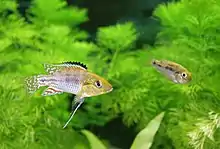| Pseudocrenilabrinae | |
|---|---|
 | |
| Pseudocrenilabrus multicolor | |
| Scientific classification | |
| Domain: | Eukaryota |
| Kingdom: | Animalia |
| Phylum: | Chordata |
| Class: | Actinopterygii |
| Order: | Cichliformes |
| Family: | Cichlidae |
| Subfamily: | Pseudocrenilabrinae Fowler, 1934[1] |
| Tribes | |
|
Chromidotilapiini | |
The Pseudocrenilabrinae are a subfamily in the cichlid family of fishes to which, according to a study from 2004, includes all the Middle Eastern and African cichlids with the exception of the unusual Heterochromis multidens and the Malagasy species.[2] This subfamily includes more than 1,100 species. Previous authors recognized additional African subfamilies, e.g. the Tilapiinae of Hoedeman (1947), Tylochrominae of Poll (1986), or Boulengerochrominae of Tawil (2001).
This subfamily inclues the cichlids from the African Great Lakes, such as the utaka and mbuna in Lake Malawi, and various species from Lake Victoria and Lake Tanganyika.
The Pseudocrenilabrinae tribes Haplochromini and Oreochromini are widespread in Africa and also found in the Middle East, while Chromidotilapiini, Hemichromini and Tylochromini are primarily West and Central African. The remaining tribes are largely or entirely restricted to Lake Tanganyika.[3]
Systematics
Apart from the tribes mentioned in the adjacent box, Bathybatini, Benthochromini, Boulengerochromini, Coelotilapiini, Coptodonini, Cyphotilapiini, Eretmodini, Etiini, Greenwoodochromini, Heterotilapiini, Limnochromini, Oreochromini, Pelmatolapiini, Perissodini, Steatocranini and Trematocarini are sometimes also recognized.[3][4] The extinct genus Mahengechromis is purportedly distinct from any of the established Pseudocrenilabrinae tribes.
Genera
The subfamily Pseudocrenilabrinae has been arranged as follows by some authorities[5]
|
References
- ↑ Fowler, Henry W. (1934). "Fishes Obtained by Mr. H. W. Bell-Marley Chiefly in Natal and Zululand in 1929 to 1932". Proceedings of the Academy of Natural Sciences of Philadelphia. 86: 462. JSTOR 4064159.
- ↑ Sparks & Smith (2004). Phylogeny and biogeography of cichlid fishes (Teleostei: Perciformes: Cichlidae). Cladistics 20(6): 501–517
- 1 2 Meyer, Matchiner, Salburger, Britta, Michael, Walter (2015). "A tribal level phylogeny of Lake Tanganyika cichlid fishes based on a genomic multi-marker approach". Molecular Phylogenetics and Evolution. 83: 56–71. doi:10.1016/j.ympev.2014.10.009. PMC 4334724. PMID 25433288.
{{cite journal}}: CS1 maint: multiple names: authors list (link) - ↑ Dunz; and Schliewen (2013). Molecular phylogeny and revised classification of the haplotilapiine cichlid fishes formerly referred to as Tilapia. Molecular Phylogenetics and Evolution 68: 64-80. doi:10.1016/j.ympev.2013.03.015
- ↑ "Pseudocrenilabrinae". NCBI. Retrieved 18 January 2019.
- ↑ Lamboj, A., Trummer, F,. & Metscher, B.D. (2016): Wallaceochromis gen. nov, a new chromidotilapiine cichlid genus (Pisces: Perciformes) from West Africa. Zootaxa, 4144 (1): 124-130.
Further reading
- I. P. Farias, G. Orti, A. Meyer: Total Evidence: Molecules, Morphology, and the Phylogenetics of Cichlid Fishes, Journal of Experimental Zoology (Mol Dev Evol) 288:76–92 (2000) PDF
- "Cichlidae". FishBase. Ed. Rainer Froese and Daniel Pauly. Nov 2006 version. N.p.: FishBase, 2006.
 Media related to Pseudocrenilabrinae at Wikimedia Commons
Media related to Pseudocrenilabrinae at Wikimedia Commons